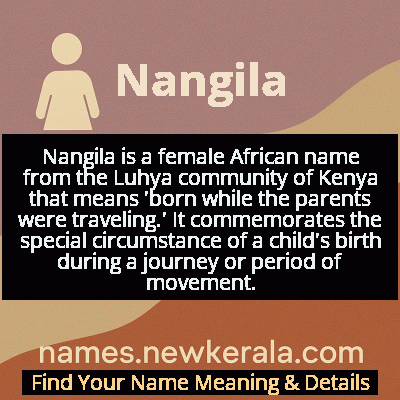Nangila Name Meaning & Details
Origin, Popularity, Numerology Analysis & Name Meaning of Nangila
Discover the origin, meaning, and cultural significance of the name NANGILA. Delve into its historical roots and explore the lasting impact it has had on communities and traditions.
Name
Nangila
Gender
Female
Origin
African
Lucky Number
4
Meaning of the Name - Nangila
Nangila is a female African name from the Luhya community of Kenya that means 'born while the parents were traveling.' It commemorates the special circumstance of a child's birth during a journey or period of movement.
Nangila - Complete Numerology Analysis
Your Numerology Number
Based on Pythagorean Numerology System
Ruling Planet
Uranus (Rahu)
Positive Nature
Strong sense of order, loyal, practical, and disciplined.
Negative Traits
Stubborn, overly serious, rigid, and prone to feeling restricted.
Lucky Colours
Blue, gray.
Lucky Days
Saturday.
Lucky Stones
Blue sapphire.
Harmony Numbers
1, 7, 8.
Best Suited Professions
Managers, engineers, accountants, organizers.
What People Like About You
Dependability, discipline, practicality.
Famous People Named Nangila
Nangila Wanyonyi
Community Health Advocate
Founded mobile health clinics serving rural Kenyan communities
Nangila Ochieng
Educator
Established literacy programs for girls in Western Kenya
Nangila Simiyu
Environmental Activist
Led reforestation initiatives in the Lake Victoria basin
Name Variations & International Equivalents
Click on blue names to explore their detailed meanings. Gray names with will be available soon.
Cultural & Historical Significance
The name also reflects the historical reality of pre-colonial and colonial Kenya, where travel was integral to economic survival and social cohesion. In contemporary contexts, Nangila symbolizes the preservation of oral history and the Luhya people's resilience in maintaining cultural practices despite modernization. It represents a bridge between generations, ensuring that stories of movement and adaptation continue to inform personal and collective identity. The name's endurance demonstrates how traditional African naming systems maintain relevance by capturing universal human experiences of journey and transition.
Extended Personality Analysis
Women named Nangila often embody characteristics of resilience, adaptability, and curiosity that mirror their name's traveling symbolism. From childhood, they tend to display remarkable comfort with change and new environments, often becoming the family members who easily adjust to relocations, new schools, or different social settings. This adaptability frequently develops into a lifelong pattern of seeking new experiences while maintaining strong connections to their cultural roots. Their personality typically combines the Luhya values of community responsibility with an innate restlessness that drives them to explore beyond conventional boundaries.
In social and professional contexts, Nangilas often become natural mediators and bridge-builders, comfortable moving between different groups and perspectives. They tend to be practical problem-solvers who approach challenges with the understanding that life, like travel, requires navigation and course correction. Many develop strong communication skills and cultural intelligence, making them effective in roles that require understanding diverse viewpoints. Despite their comfort with movement, they typically maintain deep loyalty to family and community, embodying the paradox of being both wanderers and homekeepers—individuals who can thrive anywhere while remembering where they came from.
Modern Usage & Popularity
In contemporary usage, Nangila maintains its traditional significance within Luhya communities while gradually gaining recognition among other Kenyan ethnic groups as cultural exchange increases. The name experiences consistent, though not widespread, usage in Western Kenya and among urban professionals seeking to preserve cultural heritage. While not appearing on most popular baby name lists, it holds steady appeal for parents valuing meaningful, culturally grounded names with positive connotations of adventure and resilience. The Kenyan diaspora has helped introduce the name to international contexts, where it's sometimes chosen for its melodic quality and unique story. Digital platforms and social media have increased its visibility, with some non-Kenyans selecting it for its beautiful meaning and connection to African cultural traditions. The name's modern usage reflects a balance between cultural preservation and contemporary appreciation for names that tell compelling life stories.
Symbolic & Spiritual Meanings
Symbolically, Nangila represents the human journey in its broadest sense—the understanding that life is fundamentally about movement, transition, and the wisdom gained along the way. The name metaphorically suggests that our most authentic beginnings often occur in motion rather than stasis, teaching adaptability and presence in uncertain circumstances. It carries the symbolic weight of serendipity and destiny, implying that meaningful lives can launch from unexpected places and times. This makes Nangila a powerful emblem of trust in life's unfolding process and the beauty of unplanned beginnings. The name also symbolizes the interconnection between individual identity and collective experience, reminding us that our personal stories are woven into larger family and community narratives of movement, change, and continuity across generations.

